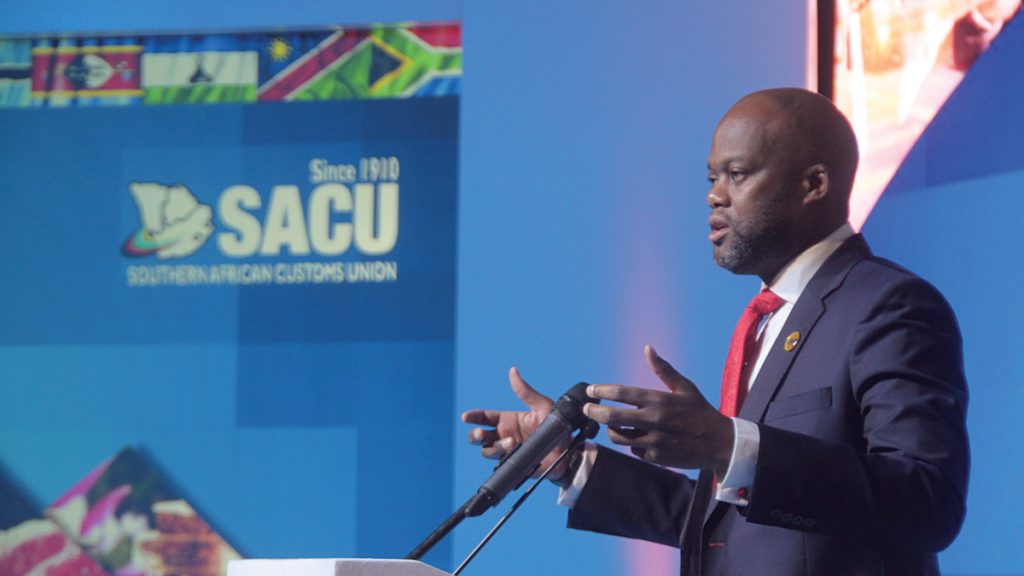- AfCTFA commits to support SACU’s industrialisation
- Industrialisation of SACU can create 750 000 jobs by 2035
- President Masisi urges SACU states to collaborate
BAKANG TIRO
editors@thepatriot.co.bw
The Secretary General of African Continental Free Trade Area (AfCFTA) Wamkele Wene has implored the ministers of Trade from Southern African Customs Union (SACU) to push for the industrialisation by investing immensely on sectors that could enhance the union’s competitiveness.
Wene told the ministers of investment, trade and industry from SACU member states of Botswana, South Africa, Eswatini, Lesotho and Namibia in Gaborone this week that SACU is rich.
According to Wene, SACU member states should invest on sectors such as agriculture, agro processing, transport and logistics to explore the potential monetary export value they carry.
He said SACU value chains have the potential to be the best contributor to the Gross Domestic Product (GDP) of the globally economy but to date due to lack of industrialisation the region is lagging behind.
According to Wene, AfCFTA should not just be inspiration but SACU should exploit it too. He said the SACU should be able to explore the market value of commodities it trades with.
“For SACU to unlock its export market value, it should focus on the value chains that it is very strong on such as agriculture, agro processing, meat, leather, textile and clothing. We have done the study that projects that if SACU can efficiently invest on these value chains by 2035, the market will contribute USD11 billion to Africa GDP and create 750 000 jobs in SACU states,” he added.
Wene said the African continent to a large extent has lower productive capacity.
He said the low productivity output results in lack of depth to create jobs as well as creating the strong export market for SACU.
“The 55 countries of Africa altogether contribute only 2% to the GDP of the global economy. This is a result of lack of industrial capacity to explore the value chains that can unlock growth. What is also hurting is that Africa contributed only USD6 billion as export value from coffee in the USD100 billion industry. This is despite the continent being filled with coffee fields,” said Wene.
For his part, President Mokgweetsi Masisi said the first ever SACU investment roundtable is very important in strategically positioning SACU as trade hub as well as enhancing its competitiveness.
Masisi, who is also the Chairperson of the SACU Heads of State and Government, said SACU has a competitive advantage to be the best global trade player by exporting more than it offers now.
According to Masisi, the investment roundtable came on the backdrop of the successful 2020 Dubai Expo which all the SACU member stated participated at in an endeavour to attract investors.
“Our countries showcased their investment opportunities and development potential. The Investment Roundtable is good way to transition into the focused approach to support economic growth. The Covid19 pandemic resulted in the socio-economic impacts as the regional economy contracted by 3.6%. The volume of goods and services reduced and we are confident as SACU massive industrialisation will boost the productivity capacity,” said Dr Masisi.
According to Masisi, the main objectives of SACU Agreement 2002 are to enhance economic development, diversification, industrialisation and competitiveness of the SACU member states.
The Executive Secretary of SACU Paulina Mbala Elago said the union is committed to developing her value chains that could be able to position it as one of the global leading exporters.
She said the theme of the roundtable under “Positioning SACU as an industrial, investment, manufacturing and innovation hub for the African continent and beyond” reiterates this commitment.
Experts at the Investment Roundtable reiterated the need for SACU states to diversify economies.
The efficient Government and private sector partnerships have been singled as gateway to growth.
SACU is a customs union made up of five countries in Southern Africa being Botswana, South Africa, Namibia, Lesotho and Eswatini. It was formed in 1910 to collect duties on local production and the customs duties on member states import from outside SACU with revenue shared among the states.
